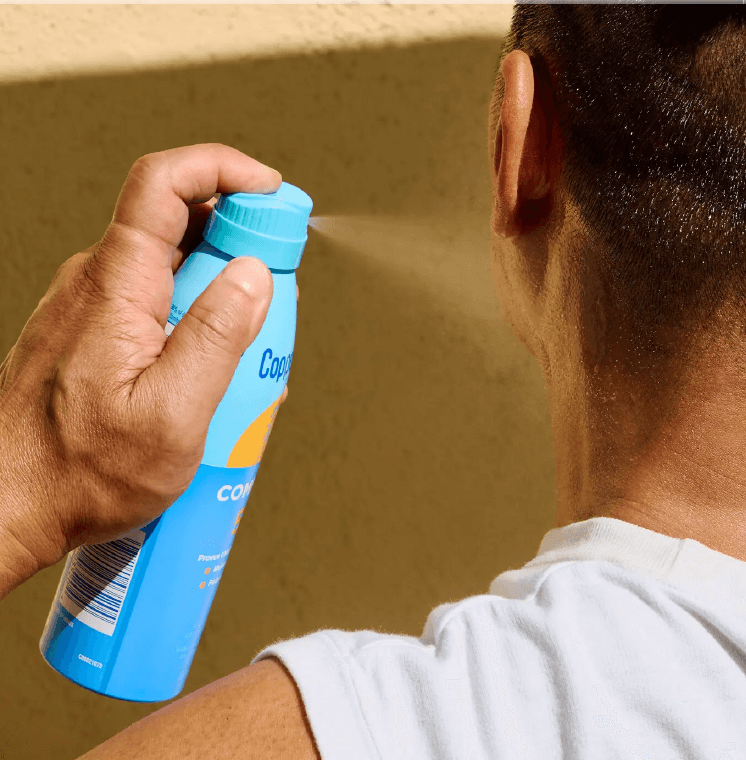Read Full Article HereQ: I use spray sunscreens all summer because they’re so easy to
put on. But are they as good as lotions?There are many things to love about spray sunscreens: They often
feel lighter on the skin and are easier to apply than their lotion
counterparts. But if you think just a few haphazard spritzes will
provide adequate protection against the sun’s harmful rays, think
again, dermatologists say.Daily sunscreen use is vital, said Dr. Maral Kibarian Skelsey, a
clinical associate professor of dermatology at Georgetown
University Medical School. It prevents sunburn and protects your
skin from long-term sun damage, which can cause wrinkles and
sun spots and raise your risk of skin cancer — the most common
form of cancer in the United States.Yet many Americans don’t apply sunscreen often enough. In a 2020
survey from the Centers for Disease Control and Prevention, just
12 percent of men and 29 percent of women said they always used
sunscreen when they were outside for more than one hour on a
sunny day.Here’s what to know about the pros and cons of spray sunscreens,
and how to use them effectively.The Benefits and Drawbacks of Spray Sunscreen
Spray sunscreens are popular because they’re so easy to use, said
Dr. Jean Charles, a dermatologist in Cedar Park, Texas. Spraying
lets you target large swaths of the body, including hard-to-reach
spots like your back.Sprays tend to be lighter, less “sticky, oily and heavy,” and less
likely to leave a white residue than lotions, said Dr. David Kim, a
cosmetic dermatologist at Idriss Dermatology in New York City.However, spray sunscreens can pose some challenges. Sometimes,
it’s difficult to tell if the sunscreen is evenly distributed, Dr. Skelsey
said. When you apply it on a windy day, more might float into the
air than onto your body.“There’s always a risk that you are going to miss spots,” Dr.
Charles said. With lotions, you can see where it’s going.Many popular products also contain flammable gases like propane,
butane or isobutane, which propel the sunscreen onto your skin
and could pose a burn hazard if applied or worn while smoking or
near an open flame.Some spray sunscreens also contain alcohol, which can irritate and
dry out the skin, Dr. Charles said.What to Look For In a Spray Sunscreen
Spray sunscreens have the same active ingredients as lotions, Dr.
Skelsey said, so they should be just as protective as lotions — if
used correctly.As with lotions, adults and children over 6 months should use
broad-spectrum spray sunscreens with an SPF of 30 or higher, Dr.
Charles said.If you have sensitive skin, Dr. Skelsey recommended mineralbased
spray or lotion sunscreens with zinc oxide or titanium
dioxide as their active ingredients; they’re less likely to cause
irritation or allergic reactions.And note that a more expensive, high-end or luxury product is not
necessarily better than a cheaper one, Dr. Skelsey said. “You can
get a very good sunscreen at a drugstore.”Beyond that, the type of sunscreen you use is up to you, Dr. Charles
said.How to Use Spray Sunscreen Effectively
According to the American Academy of Dermatology, you need
about an ounce of sunscreen to cover your entire body. This
amount — about a shot-glass-worth of sunscreen — can be hard to
gauge with a spray, so the academy recommends holding the
nozzle about an inch from your body and spraying until your skin
glistens.Don’t forget often-overlooked areas, like your feet, ears, neck,
hands and scalp, Dr. Skelsey said.The most important step is to rub the sunscreen in after applying
it. If you don’t, the skin may not be evenly covered, Dr. Kim said,
“I’ve seen people on the beach just spray it and that’s it.”Another option: Spray it onto your hands and smear it over your
body, Dr. Charles added.Then, reapply it as you would any sunscreen, every two hours — or
more frequently if you’re swimming or sweating, Dr. Skelsey said.
“It’s important enough that you should really set a timer.”Be careful not to inhale spray sunscreen; the A.A.D. suggests
applying it to your hands first and then rubbing it onto your face.
And the Food and Drug Administration recommends not leaving
sunscreen in direct sunlight because it can reduce its effectiveness.
Instead, keep the containers in the shade or wrapped in a towel.Double check the expiration date on sunscreen, which is required
by the F.D.A. and toss it if it’s expired, since it’s likely no longer
effective, Dr. Charles added.What Dermatologists Recommend
“The best sunscreen is the one that you will actually use,” Dr. Kim
said, so choose any type of product you like. If that’s a spray
sunscreen, “go for it,” he said.However, all of the experts said that they typically recommend
lotion versions over sprays, since most people tend to apply spray
sunscreens incorrectly. But that doesn’t mean sprays aren’t
effective, they said.“I don’t think one’s necessarily better than the other,” Dr. Charles
added, “as long as it’s being rubbed in and the application is even.”
Are Spray Sunscreens Effective?
June 4, 2024








